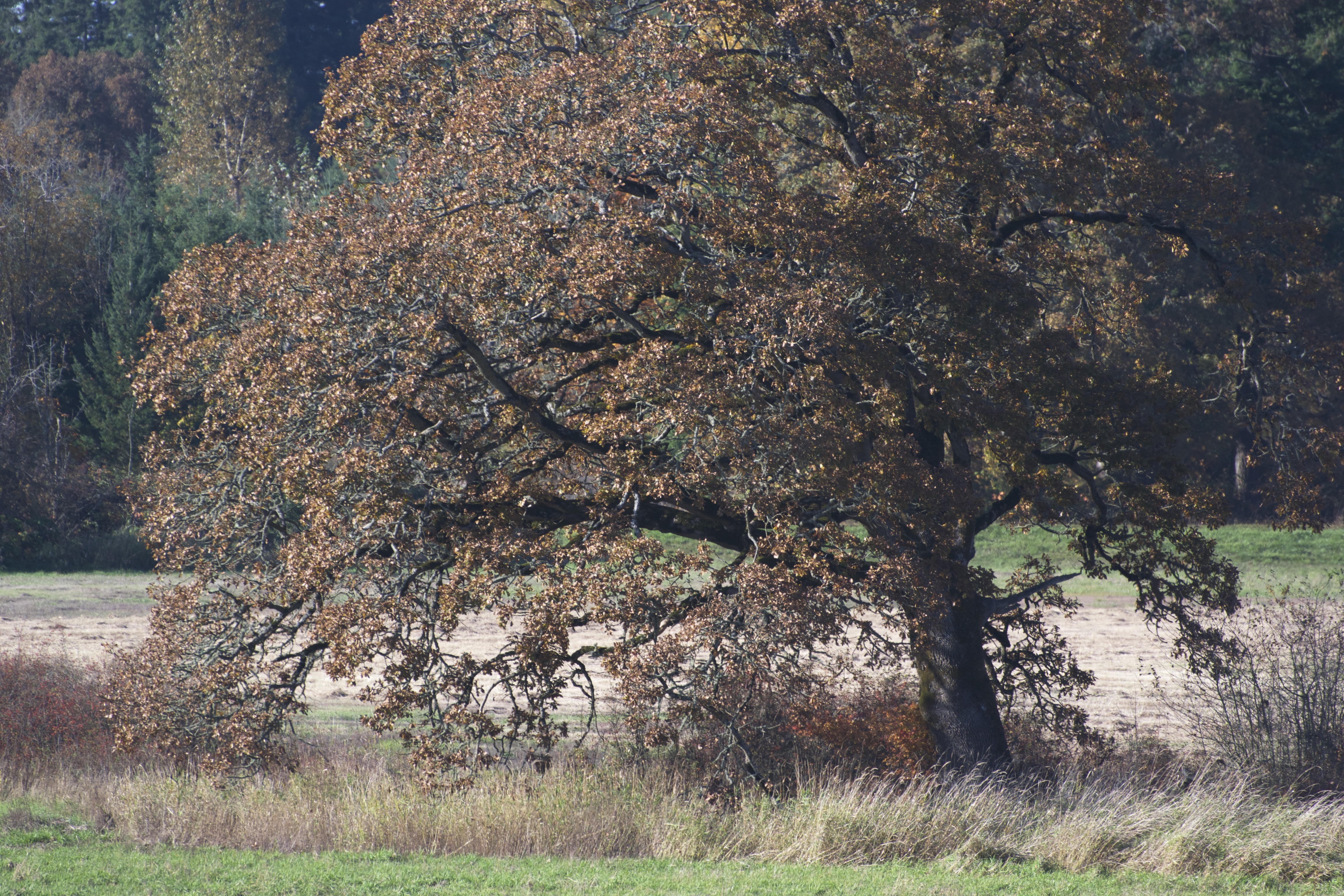So ok, I was muttering. Venting, really. Blabbering. One of those days when everything that could irritate did irritate. R e a l l y irritate.

No, I was muttering: like unintelligible speech, multitudinous murmurs, mysterious tongues – a living, walking Longfellow oak in human form…. might as well go for a walk and join my brethren.

Eliot’s Oak
by Henry Wadsworth Longfellow
Thou ancient oak! whose myriad leaves are loud
With sounds of unintelligible speech,
Sounds as of surges on a shingly beach,
Or multitudinous murmurs of a crowd;
With some mysterious gift of tongues endowed,
Thou speakest a different dialect to each;
To me a language that no man can teach,
Of a lost race, long vanished like a cloud.
For underneath thy shade, in days remote,
Seated like Abraham at eventide
Beneath the oaks of Mamre, the unknown
Apostle of the Indians, Eliot, wrote
His Bible in a language that hath died
And is forgotten, save by thee alone.

Photographs, then, of today’s oak trees in Tualatin, where I didn’t care that I have no clue who the Eliot is in this poem that I dimly remembered.


I stopped muttering, when the birds took over with their various honking, trilling, whistling, or whatever bird sounds come out of sparrows, flickers, waxwings, shrub jays, bald eagles and geese. Let’s just all agree on mysterious tongues….








Well, and then, of course, I went home and had to look it up. Who was this Eliot?
“Plant explorer Ernest Henry Wilson (1876-1930) also photographed many famous North American oaks, such as the Eliot Oak. The Eliot Oak stands “a few rods east of the Unitarian Church in S. Natick [Massachusetts].” It is a very old white oak that possibly dates to at least the 1650s, and according to one legend that gives rise to its name, the Reverend John Eliot (1603-1690) preached to Indians beneath its canopy. Professor Stowe, in an address on the 200th anniversary of the town of Natick, described Eliot as “a man of great versatility, and very superior intellectual power. Doubtless he had his equals, but never a superior in Christian zeal and goodness.”
The famous poet Henry Wadsworth Longfellow (1807–1882) personified and commemorated this oak in his “Sonnet on Eliot’s Oak” (1877). These verses emphasize the human traits of the oak, as its leaves murmur loudly with “sounds of unintelligible speech,” that nonetheless communicate the word of God and the wonders of his natural world just as the preacher Eliot presumably did. Also, the final lines acknowledge Eliot’s authorship of the Algonquin Bible, the first Bible printed in America and written in the Algonquin language.” (Source: arboretum/Harvard/edu)

Can I take off and go back to muttering now?

Or listen to some Wagnerian forest murmurs?






Sara Lee
WONDERFUL posting. In so many particulars. Thanks!
Martha Ullman West
“Poems are made by fools like me but only God can make a tree….” Not. Lovely lovely photos, and if I never have to read another poem by Longfellow, oh never mind. If I could find it on Youtube, maybe I’ll look, I’d post Mark Morris’s wonderful solo, in his underwear, with a paperbag over his head, to Joyce Kilmer’s “Trees”, in an art song version, which he performed in Shattuck Studio Theatre at PSU before it became an architecture classroom, way back in the last century.
Lou Palermo
THIS MADE ME SO HAPPY!!